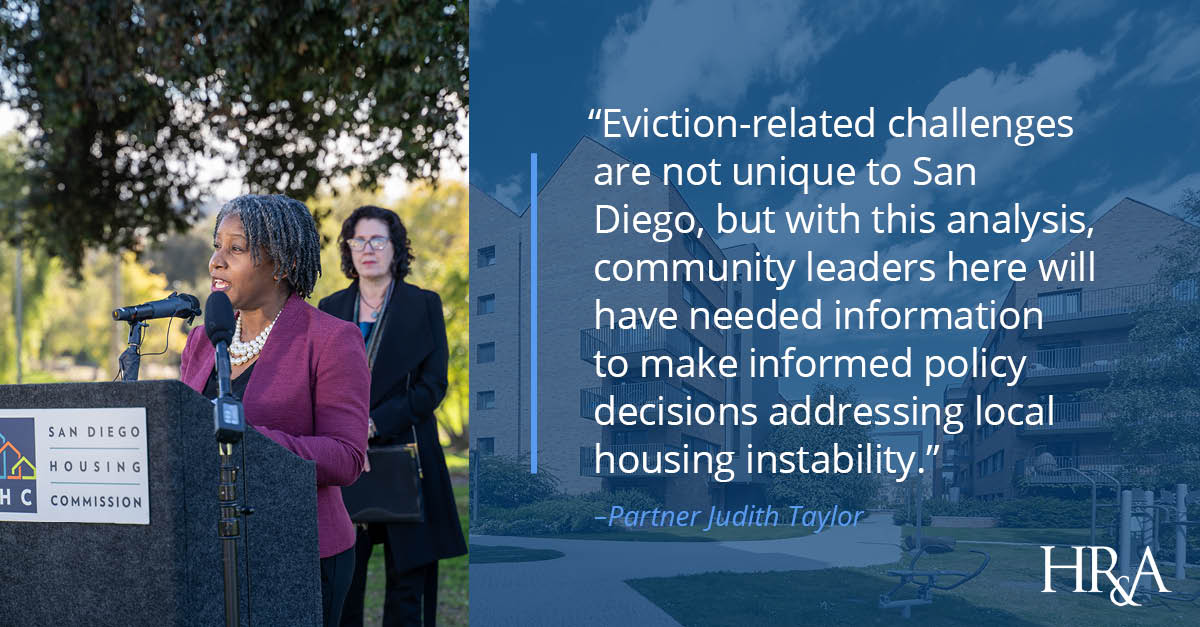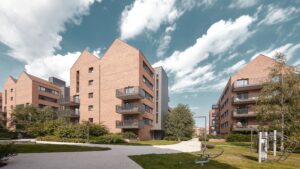on Jan 12, 2024
San Diego Housing Commission Study of Residential Evictions in the City of San Diego Provides Insights for Eviction Prevention Efforts

San Diego Housing Commission Study of Residential Evictions in the City of San Diego Provides Insights for Eviction Prevention Efforts
This press release was originally issued by San Diego Housing Commission.
Study may inform the evaluation and development of opportunities to potentially strengthen existing eviction prevention and housing stability initiatives
SAN DIEGO, CA — Communities with lower income, higher rental cost burden, a higher proportion of Black and Hispanic households, more single-parent households, and higher unemployment levels are more likely to experience evictions in the City of San Diego, according to a recent San Diego Housing Commission (SDHC) study of residential eviction trends from 2017 to 2022. The study, “Analysis of Residential Evictions in the City of San Diego,” was published today on SDHC’s website.
“All San Diegans need and deserve to live in secure and stable housing. This study highlights the housing challenges many residents face, particularly those from historically disenfranchised communities,” said San Diego City Council President Sean Elo-Rivera. “As a City, we need to do much more to guarantee everyone can have a roof over their head where they can live with dignity. Making sure our friends, family, and neighbors can afford to remain in and not be unnecessarily removed from their homes adds to the safety and stability of our neighborhoods and is an essential piece of our homeless prevention strategy. We must take active steps to prevent evictions, ensure people don’t fall into homelessness, and provide greater housing opportunities for all income levels.”
SDHC initiated the study in February 2023, as households began to face potential evictions in greater numbers upon the conclusion of federal assistance and renter protections implemented during the COVID-19 pandemic.
“As rents continue to rise and vacancies remain low, individuals and families throughout the city will continue to struggle to pay rent and keep up with other living expenses at the same time. The potential for eviction is real for many households,” SDHC President & CEO Lisa Jones said. “This study analyzed data, reviewed best practices and sought input from renters themselves to provide our policy makers crucial information as they consider next steps to enhance eviction prevention.”
SDHC completed the study in consultation with HR&A Advisors, a public policy firm with more than 40 years of experience in real estate and economic development.
“The goal of this report is to establish a baseline of existing conditions and trends related to residential evictions here in San Diego,” said Judith Taylor, a Partner at HR&A Advisors, Inc. “I want to thank the City of San Diego and the San Diego Housing Commission for acknowledging the importance of these issues and for conducting this study. Eviction-related challenges are not unique to San Diego, but with this analysis, community leaders here will have needed information to make informed policy decisions addressing local housing instability.”

SDHC contracts with Legal Aid Society of San Diego to operate the City of San Diego Eviction Prevention Program, which launched in December 2021.
“The housing crisis in San Diego is one of the most pressing problems facing our residents today,” said Joanne Franciscus, CEO and Executive Director of the Legal Aid Society of San Diego (LASSD). “More than half of the cases LASSD handles are evictions and other housing-related cases. Evictions not only threaten people’s housing but their health, employment, education and financial well-being for years to come. Effective eviction prevention requires a comprehensive, multifaceted solution that starts with lawyers enforcing people’s rights. LASSD is grateful to the City of San Diego and the San Diego Housing Commission for their forward thinking and ongoing support of the Eviction Prevention Program, through which we and our community-based partners provide legal representation, education, outreach, case management services, and emergency financial assistance that have helped thousands of San Diegans avoid eviction and homelessness to date.”
The study included analysis of Superior Court case data, Sheriff’s Department lockout data, U.S. Census Bureau data, survey responses from more than 6,000 residential renters in the City of San Diego, roundtable discussions with community-based organizations, and a review of best practices in cities nationwide.
Approximately 3,700 renter households annually in San Diego faced formal eviction proceedings before the pandemic, as measured by unlawful detainer case filings, according to SDHC’s study. However, that total does not fully capture tenants who received an eviction notice or faced informal evictions outside of the legal system. Research outside San Diego suggests that informal evictions could be twice as high as formal evictions, based on data before the COVID-19 pandemic, according to Enterprise Community Partners’ 2022 report, “Home for Good: Strategies to Prevent Eviction and Promote Housing Stability.”
The SDHC study also found that the geographic distribution of evictions remained consistent year over year. Central and Southeastern San Diego have historically faced the highest levels of evictions (Downtown San Diego, Southeastern San Diego, Otay Mesa, City Heights, Mission Valley and Tierrasanta). Neighborhoods with a higher share of Black and Hispanic residents, single-parent households, and residents who are unemployed were also more likely to experience higher rates of evictions (Southeastern San Diego, Barrio Logan, Encanto, Valencia Park, Lomita, Otay Mesa, and Nestor).
Key takeaways from the study also include that community-based nonprofits, cultural organizations and religious groups are essential partners in eviction prevention efforts.
Study Recommendations
-
- Continue focusing eviction prevention outreach, educational and service provision efforts on neighborhoods experiencing high rates of evictions.
- Consider opportunities to strengthen existing tenant protections.
- Continue to assess the usefulness of and opportunities to enhance the Tenant Termination Notice Registry after completion and implementation of the registry.
- Explore options to enhance the Unlawful Detainer Court Case Database and deepen understanding of those affected.
- Explore the development of benchmarks and targets for the City of San Diego Eviction Prevention Program (EPP) to support the understanding of whether existing outreach efforts and service provision are meeting community needs sufficiently.
- Explore potential avenues and advocate for increased resources to bolster financial assistance programs, particularly emergency rental assistance.
- Continue partnering with and supporting capacity building of the Eviction Prevention Collaborative (EPC).
- Consider an eviction-focused, citywide needs assessment.
- Continue to focus on ways to increase preservation, production and access to affordable housing through a “whole-system” approach.
Additional Coverage:
San Diego has boosted protections for renters. It’s not enough, report says., San Diego Union-Tribune
Who’s most likely to experience eviction in San Diego?, NBC San Diego
Housing commission completes eviction study, comes away with recommendations, KPBS
Photo: Maciej Drazkiewicz